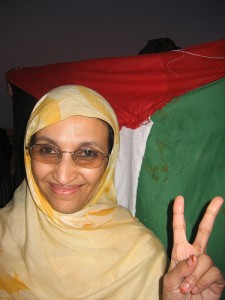Sahrawi activist Aminatou Haidar has recently been awarded the first annual International Jovellanos “Resistance and Freedom” Prize, bestowed by the governments of the Spanish regions of Asturias and the Balearic Islands, in order to
“acknowledge the civic values of people from anywhere in the world who have distinguished themselves through their struggle for freedom and human rights and in particular, of persons who have unjustly been the object of persecution, or are undergoing or have undergone detention, sentences or punishment because of their commitment to freedom, tolerance and humanity.”
The committee’s selection of Haidar as award recipient was unanimous, and recognizes “her determination in bearing witness to the principles embodied by the exercise of freedom and for the courage with which she resisted the pressure applied to her legitimate free will.”
As an activist from Western Sahara, a region of north-western Africa once colonized by Spain and now under highly contested (and internationally unrecognized) Moroccan control since 1975, Haidar has long been active in advocating for her country’s independence, and was jailed in 2005 for her role in a pro-independence political demonstration. Her accomplishments have previously been honored with international awards from Spain, Austria, and the United States, as well as a nomination for the Nobel Peace Prize.
More recently, in November 2009, Haidar was returning from an overseas trip, and was detained at her home airport, apparently for refusing to identify her country of residence as “Morocco.” Barred from entering her own country, Haidar was sent to the Lanzarote airport in the Canary Islands, where she remained in a state of legal limbo, forbidden to enter her country but without travel papers to go elsewhere. Haidar began a hunger strike, consuming only water and sugar, in protest of the conditions in which she was living, as well as the situation her country, and the repression that her people experience. Thirty-two days later, on December 18, having developed severe health problems, Haidar ended her hunger strike when the Moroccan government finally relented and allowed her to return to her home in Western Sahara. Since then, she has been living under constant police surveillance.
Although it was not the first time Haidar had made herself known as a committed activist for the cause of Sahrawi independence, her hunger strike has taken on a huge symbolic value: Haidar has been called an example of “a generation that dreams of nothing but seeing its country free and sovereign” and that “refuses to capitulate.”* When the Moroccan government and the Polisario Front, the national independence movement of Western Sahara, planned talks that took place last week, this was attributed in part to Haidar’s hunger strike, whether for its role in increasing tensions, putting pressure on the Moroccan government, or attracting international attention to the issue.
Haidar has received much attention in a variety of news sources (although significantly fewer English-language sources than French, Spanish, and likely Arabic ones), and is described repeatedly as a “Sahrawi Gandhi.”
I wonder, however, about the degree to which this solidarity will actually be expressed in more concrete ways. On a personal level, Haidar continues to experience the fallout of her hunger strike with relation, for example, to her personal health and to her freedom of movement within her country. On a broader level, acknowledging the personal strength and commitment of Haidar is important, but if she is such a compelling symbol of the Sahrawi struggle, how will the rest of the world respond to the struggle itself, beyond the awards and nice words?
*My translations.

